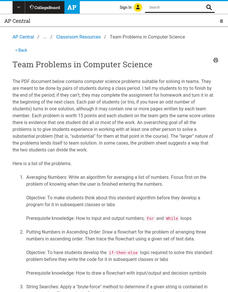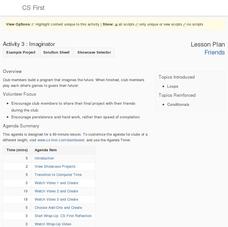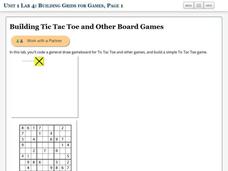Code.org
Looping and Random Numbers
Repetition, repetition, repetition. Get your class to efficiently repeat a section of code over and over again by introducing looping. Class members learn looping to quickly recreate objects they want to appear more than once in their...
Beauty and Joy of Computing
Building Your Own Blocks
Isn't building with blocks an activity for toddlers? The third lab of a five-part unit teaches young computer scientists how to create their own block instructions for programming. They use these blocks to create geometric figures, spell...
College Board
Team Problems in Computer Science
There is no I in team. Seven team problems provide classmates the opportunity to work with a partner on a task. Projects span the course and require pupils to apply their knowledge. Tasks range from writing the algorithm in English to...
Google
Friends: Imaginator
What does a future as a computer scientist look like? Pupils learn about loops in computer coding by writing a story about the future. They include the repeat until and wait blocks in the Scratch program to incorporate these loops.
Code.org
Minecraft Hour of Code
Devote an hour to computer coding ... it's time well spent! The activity has young computer scientists write code to solve puzzles in the Minecraft game. They learn how to apply block codes and repeat loops.
Beauty and Joy of Computing
Sprite Drawing and Interaction
Discover how to program objects to move on a screen. In the second lab of a five-part unit, each learner uses block instructions to program a sprite to follow their mouse (cursor). They investigate how to use these same block...
Beauty and Joy of Computing
Building an App
Create your own app with the first lab of a five-part unit. Future computer scientists learn the basics of programming a game application. They use a given software program to design an app where users try to click on a moving...
Beauty and Joy of Computing
Building Grids for Games
You can't play Tic Tac Toe without grids. In the fourth lab of a five-part unit, scholars learn how to build grids for games such as Tic Tac Toe. Along the way, they also learn about reporter blocks that perform calculations.







